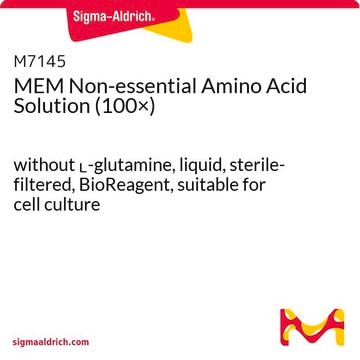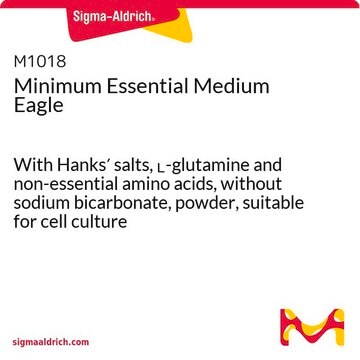M5650
Milieu essentiel minimum d′Eagle
With non-essential amino acids, Earle′s salts and sodium bicarbonate, without ʟ-glutamine, liquid, sterile-filtered, suitable for cell culture
Synonyme(s) :
MEM
About This Item
Produits recommandés
product name
Milieu essentiel minimum d′Eagle, With Earle′s salts, non-essential amino acids and sodium bicarbonate, without L-glutamine, liquid, sterile-filtered, suitable for cell culture
Niveau de qualité
Stérilité
sterile-filtered
Forme
liquid
Technique(s)
cell culture | mammalian: suitable
Impuretés
endotoxin, tested
Composants
phenol red: yes
NaHCO3: yes
L-glutamine: no
sodium pyruvate: no
HEPES: no
Earle’s salts (5% CO2): yes
Conditions d'expédition
ambient
Température de stockage
2-8°C
Vous recherchez des produits similaires ? Visite Guide de comparaison des produits
Description générale
Application
- HeLa cells
- Madin-Darby canine kidney (MDCK) cells
- chondrosarcoma cell line
This medium may be preferred for the growth of adherent cells in the presence of reduced serum or as a base for the development of a serum-free medium.
Reconstitution
Produit(s) apparenté(s)
Souvent commandé avec ce produit
Supplément
Code de la classe de stockage
11 - Combustible Solids
Classe de danger pour l'eau (WGK)
WGK 1
Point d'éclair (°F)
Not applicable
Point d'éclair (°C)
Not applicable
Certificats d'analyse (COA)
Recherchez un Certificats d'analyse (COA) en saisissant le numéro de lot du produit. Les numéros de lot figurent sur l'étiquette du produit après les mots "Lot" ou "Batch".
Déjà en possession de ce produit ?
Retrouvez la documentation relative aux produits que vous avez récemment achetés dans la Bibliothèque de documents.
Les clients ont également consulté
Notre équipe de scientifiques dispose d'une expérience dans tous les secteurs de la recherche, notamment en sciences de la vie, science des matériaux, synthèse chimique, chromatographie, analyse et dans de nombreux autres domaines..
Contacter notre Service technique





